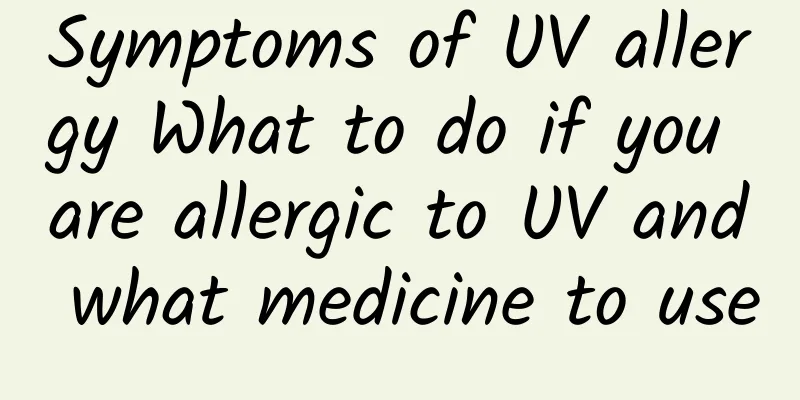Symptoms of UV allergy What to do if you are allergic to UV and what medicine to use

|
In fact, prevention is more important for ultraviolet allergies. It is recommended that you eat more fruits and vegetables containing vitamin A, try not to use hot water, alkaline soap, etc. when washing your face, and avoid prolonged exposure to the sun when traveling. Symptoms of UV allergySymptoms of UV allergy usually manifest as itching in the area exposed to sunlight. The longer the exposure to sunlight, the more severe the allergic reaction, and the itching will last for 24 to 48 hours or even longer. The ultraviolet rays in the sun can cause cataracts. Since the damage to the eyes caused by sunlight is not easily noticed by patients in the short to medium term, its potential threat should not be ignored. First-degree ultraviolet allergy is manifested by diffuse erythema on the local skin after sun exposure. Second-degree ultraviolet allergy is manifested by local skin redness and swelling, followed by blisters or even bullae, with tense blister walls and light yellow blister fluid. Subjective symptoms include burning or itching. After the blisters rupture, they become erosive surfaces, which soon dry and form scabs, leaving pigmentation. Very severe ultraviolet allergy may be accompanied by systemic symptoms such as fever, headache, palpitations, fatigue, nausea, and vomiting. What to do if you are allergic to UV raysWhat should we do if we are allergic to ultraviolet rays? It is particularly important to master some simple and effective treatment methods. Common treatments are Western medicine or diet therapy. Let's take a closer look. Western medicine treatment: Western medicine treats ultraviolet allergy by generally giving anti-allergic drugs to relieve allergic symptoms. This is a more conventional treatment. Internal treatment method: 1. Eat more foods containing vitamin A and fresh vegetables and fruits to maintain the normal function of the skin. Some photosensitive foods that can induce seasonal dermatitis should be eaten as little as possible or not. 2. Try not to use hot water, alkaline soap, or rough towels when washing your face. 3. Do facial beauty exercises every day. Tips from Encyclopedia Knowledge Network: Eat more anti-allergic foods and less photosensitive foods; common photosensitive foods include: celery, lettuce, rapeseed, spinach, amaranth, Chinese cabbage, astragalus, gray vegetable, mustard, amaranth, fig, lemon, white radish, coriander, leek, etc. are all photosensitive plants. It is recommended that you avoid activities under strong sunlight and eat more foods rich in vitamins and fibers to effectively prevent allergies; in addition, you should use sunscreen with caution, because many allergic skins are allergic to sunscreen. You should do an allergy test before use. You can use a little on the back of your hand first. If there is no adverse reaction, use it on a large area. What medicine is used for UV allergyIf we are allergic to ultraviolet rays, what medicine should we use to be more effective? It is recommended to take antihistamines, such as Claritin, one tablet a day, and vitamin C tablets, calcium gluconate tablets, etc. In addition, you can also go to the pharmacy to buy some special anti-itching and anti-inflammatory ointments, such as anti-allergic anti-itch cream, Yizhongtang's gel cream, and appropriate external use of calamine lotion or Wuji ointment. The price is affordable, but the effect is obvious. Secondly, in terms of treatment, you can choose to use external ointments containing Chinese medicine ingredients. Lvyuan Cream is effective in achieving the corresponding recovery effect. The above medication must be carried out under the guidance of a doctor, because of different personal constitutions and symptoms, the medication is of course different, do not take or apply it by yourself. In addition, for ultraviolet allergies, prevention is actually more important. It is recommended that you eat more fruits and vegetables containing vitamin A. Try not to use hot water, alkaline soap, etc. when washing your face. Avoid prolonged exposure to the sun when traveling. You can apply sunscreen or use a parasol appropriately. |
>>: What blood type attracts mosquitoes the most? What kind of people do mosquitoes like to bite?
Recommend
What are the nutritional recipes for pregnant women in one week?
Pregnant women should pay attention to diet durin...
What are the clinical manifestations of uterine cysts?
Cervical cysts often occur in married women. Gene...
What are the symptoms of appendicitis in women
Appendicitis is a common gastrointestinal disease...
Since the composition of formula milk and breast milk is different, is it safe to feed with formula milk for a long time?
Yesterday we talked about the composition of brea...
Did you know? These vitamins can boost your immune system
Knowing which vitamins can boost the immune syste...
The efficacy and role of lotus root for women
Lotus root is a vegetable we often eat. It is the...
Do you know how to sunbathe?
I have always advocated improving the overall qua...
What is a cold body constitution? How to treat cold body constitution? What to eat?
Many people, especially women, are prone to feeli...
Why does a 50-year-old woman have continuous menstruation?
When a woman reaches the age of fifty, she has ba...
Itchy body after abortion
After an abortion, if a woman feels her skin is i...
How to use insulin? What should I pay attention to?
Insulin is a common hypoglycemic drug. Since its ...
What if my breasts hurt like needles?
Women's breasts are very important for their ...
Can you feel uterine prolapse?
If the uterus is prolapsed obviously, the uterus ...
Oil fumes cause lung cancer, cooking oil is crucial!
In China's long history of food cooking, fryi...









